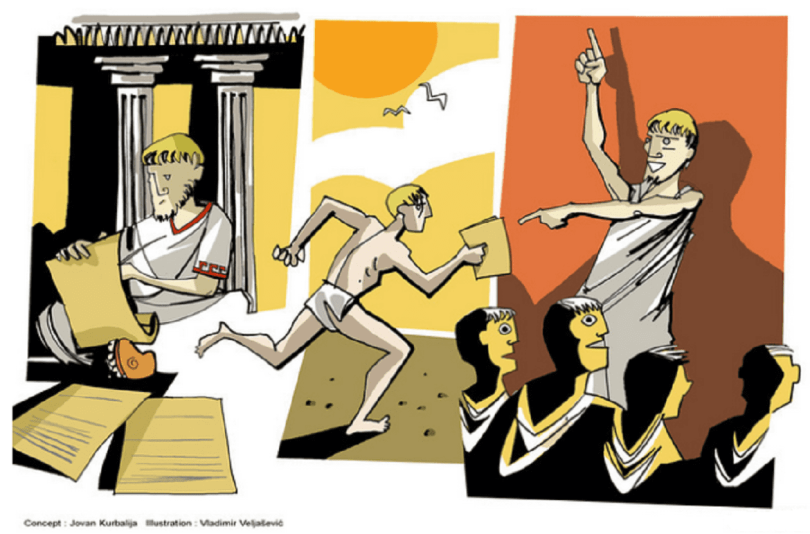If, in Carl Von Clausewitz’s view, “War is merely an extension of diplomacy by other means,” then the role of diplomacy is at the core of state survival. Wars are won or lost by diplomats, sometimes regardless of who won or lost on the battlefield. The master himself, Sun Tzu, wrote over two millennia ago, “The art of war is of vital importance to the State. It is a matter of life and death, a road either to safety or to ruin. Hence it is a subject of inquiry which can on no account be neglected.”
Examples of a state losing a war militarily but diplomatically emerging victorious include the creation of Republican Turkey after Ottoman Turkey’s defeat in WWI and having committed an unrepentant genocide of the Armenians. Turkey acquired land in an agreement with Iran that gave Turkey a border with Nakhichevan ASSR, with Iran gaining some border lands from Turkey. As a result, Iran lost an additional land connection with Armenia near the smaller Mount Ararat in the 1930s.
Turkey wrestled away the Syrian region of Alexandretta (today’s Hatay Province) from its French mandate. The region was given to Turkey in 1938 as a bribe so Turkey wouldn’t side with Nazi Germany as WWII unfolded. Turkey signed a non-aggression treaty with Nazi Germany in 1941. In 1973 Turkey took the opportunity, sanctioned by Henry Kissinger, to attack and occupy the northern half of the sovereign island of Cyprus. Today, based on prevailing conditions, Turkey has been able to wage war against Syria and its Kurds. The mechanisms include massive demographic manipulation from the Syrian Mediterranean coast along the southern Turkish border and into Iraqi Kurdistan. Turkey supplanted the Azerbaijani general staff and waged Azerbaijan’s Second Karabakh war against its indigenous Armenians and was praised by the NATO Secretary General Stoltenberg at the height of the conflict. None of these events over the past century occurred by accident and certainly not with transactional thinking. Turkey knew what it wanted and waited for the right conditions making it possible to serve its longer-term goals of expanded power by land acquisition and soft power.
Volumes have been written on international relations and diplomacy. It suffices to say that the only absolute norm is what states can get away with, when, and at what cost. The global political system is anarchic, like the Law of the Jungle. Many people claim to know this yet fail to understand that constant state vigilance keeps one from becoming the prey. There is a price to be paid for an incompetent diplomatic corps associated with national security subordinate to the interests of those with levers of power, such as oligarchs.
For relatively weak buffer states, the long-term interests of oligarchs may not coincide with what is necessary for the state’s survival. Examples include market monopolizing, forcing businesses to be absorbed or closed down, selective military procurement, legislative coercion, etc. Oligarchs associate themselves with those with similar values, often preventing those with new ideas from entering the ruling class and countering the status quo. With people either having no hope of entering the ruling class or their votes being irrelevant, societal complacency results. Oligarchs were the topics of many ancient Greek philosophers. In the words of Socrates:
 “One, seeing another grow rich, seeks to rival him, and thus the great mass of the citizens become lovers of money,” and “The government will not be able to wage war, because of the necessity of either arming and employing the multitude, and fearing them more than the enemy, or else, if they do not make use of them, of finding themselves on the field of battle . . . And to this must be added their reluctance to contribute money, because they are lovers of money.”
“One, seeing another grow rich, seeks to rival him, and thus the great mass of the citizens become lovers of money,” and “The government will not be able to wage war, because of the necessity of either arming and employing the multitude, and fearing them more than the enemy, or else, if they do not make use of them, of finding themselves on the field of battle . . . And to this must be added their reluctance to contribute money, because they are lovers of money.”
Not much has changed in twenty-five hundred years. This situation has been exacerbated by the increase in oligarchic governments globally, under the guise of democracies, with a correlated increase in citizen powerlessness.
Armenia’s levers of power are in the hands of oligarchs regardless of any faction ruling Armenia. While this may not be much different from the global trend, Armenia’s geopolitical situation mandates it to act in the interest of its survival, not emulate countries with hundreds of times larger GDPs and far more resources and situational advantages to enable them to successfully defend themselves and survive physically. When national interests are unclear or never publicly articulated, they will be taken advantage of by one’s enemies, both internal and external. Worse, when national interests are left to speculation, subsequent legislation, decisions, and negotiations become transactional and ad hoc, never serving a long-term strategy.
No state can survive without a direction. A grand national strategy is “a state’s strategy of how means can be used to advance and achieve national interests.” This strategy helps navigate the state’s structures in that direction. A diplomatic corps cannot function correctly without direction and design that supports the state’s interests. A dysfunctional diplomatic corps is a threat to the existence of a state, for the state will be unable to maintain sovereignty, especially during war and threats thereof, and those in positions as diplomats may be forced to accept usually unacceptable conditions during negotiations.
On September 7, 2022, Member of Armenia’s Parliament, ex-Chief of Staff to the current Prime Minister (2021), and ex-Minister of Health (2018-2021), Arsen Torosyan, stated in a video interview, “There is no chance to recognize the independence of Artsakh [Nagorno-Karabakh], and there has never been.” Torosyan continued, “This idea was a self-deception.” Excerpts from the interview are here, translated. This is a highly controversial statement from a pro-government media outlet. The current ruling party of Armenia, with Nikol Pashinyan as its Prime Minister, is claiming that (1) in thirty years, Armenia’s entire process associated with securing the rights of the Armenians in Nagorno-Karabakh has been fraudulent, yet (2) under Pashinyan’s watch over four thousand Armenian soldiers and civilians died in the 2020 Second Karabakh War which, purportedly, was to defend, Nagorno-Karabakh. Armenians remaining in Nagorno-Karabakh are living at the whim of virulent, belligerent, anti-Armenian Baku.
Those with personal interests in the capitulation of Nagorno-Karabakh from Armenia’s reality use Armenia’s 2020 inability to secure the region as proof of its inviability within an Armenian context. Claiming the international community supports the sanctity of borders flies in the face of the creation of Kosovo and Israel’s effective annexation of Syria’s Golan Heights, other lands, and today’s violation and occupation of Armenian land by Azerbaijan. Self-proclaimed Armenian experts and narcissists can claim victory, just as an incompetent surgeon could claim victory having amputated a gangrenous arm just before a massive bodily infection while never having used antibiotics or other treatments.
If the current Armenian ruling party believes Torosyan’s statement, they should have immediately released Nagorno-Karabakh to Azerbaijan upon assuming power in 2018. They didn’t because they would not survive as Armenia’s ruling party, yet they could if they lost a war, deflecting blame on a more powerful enemy. This further supports a leading hypothesis that the 2020 Karabakh War was an engineered failure, facilitating the release of Nagorno-Karabakh with the capitulated government voted back into power. The latter is unprecedented in modern human history; a government responsible for a losing war is voted back into power. This fact alone speaks volumes to Armenia’s enemies.
The ruling party’s policy, as stated by Torosyan, “hopes” that militarily more powerful Azerbaijan and strategic ally Turkey, with NATO’s second-largest army, will reciprocate with some acts of benevolence. Since the end of the 2020 Karabakh War in November 2020, Azerbaijan has not done so. In sharp contrast, Azerbaijan only demanded more from Armenians, but during the overnight hours of September 12th and 13th Azerbaijani forces crossed the border it claims is recognized internationally and attacked Armenian military installations and civilians, killing hundreds.
The Armenian government touted a ‘peace dividend’ after the 2020 war, yet no economic study exists justifying such a claim. Increased economic relations are no guarantee of increased state sovereignty. One need only study the case of the Republic of Georgia and how Turkey and Azerbaijan heavily influence its foreign policy. Georgian airspace was used to resupply Azerbaijan with foreign arms and facilitate the hundreds of ISIS fighters introduced into the 2020 Karabakh War, butchering Armenians.
Like schoolyard dynamics, the bully and accompanying minions do what they wish at the expense of the weak. The powerful even go so far as to seek out the weak hiding behind walls or buildings. And bullies, being uncivilized and unsophisticated, subscribe to their own anarchic rules and behavior, contradicting the best ideas and foundation of human civilization.
Thus, in the schoolyard, the weak must outthink their enemies and use all possible diplomatic tools to avoid war. Those who are strong or project an illusion of strength might gain the respect and pause of the powerful. However, the aforementioned, wise Sun Tzu also said “You prepare for war so you don’t have to go to war.” The latter philosophy really means that one must be able to back up one’s position—to be able to call any bluff of the enemy. If one is neither able to bluff nor able to show strength, one is lost.
Armenia exhibits neither strength nor skill in diplomacy. Those in the Armenian diplomatic corps might say the world runs by the Law of the Jungle while trained in a Western context or have dotted line connections with Armenian oligarchs. Yet none have delineated Armenia’s internal and external existential threats nor demonstrated they are even capable of creating — let alone articulating — a strategic national vision out of fear or ignorance.
Any state that foolishly assumes that regional power balance will remain in the status quo will pay the consequences. Instead, what the current rulers of Armenia have done since coming to power is to decimate the military while enhancing the police and government security apparatus.
Giving the impression that Armenia is not a threatening entity to its enemies, Yerevan consistently makes apologetic or conciliatory statements about Azerbaijan. This foreign policy (for lack of a better description) was first coined by Armenia’s first ex-Soviet president, Levon Ter Petrosyan, in his infamous statement, “Our defense lies in our defenselessness.” How any leader expects to base the security of a state on such a degenerate principle is shocking. The whole schoolyard heard his statement, reiterated by the current Armenian ruling regime in many forms. Today, Armenia is under an existential threat from Turkey and Azerbaijan, the latter having taken advantage of the dynamic changes in the geopolitical landscape.
Yerevan, Armenia
Author: David Davidian (Lecturer at the American University of Armenia. He has spent over a decade in technical intelligence analysis at major high technology firms. He resides in Yerevan, Armenia).
https://wgi.world/armenian-diplomacy-socrates-and-the-schoolyard/



